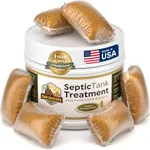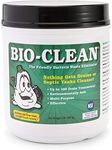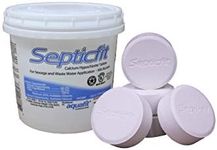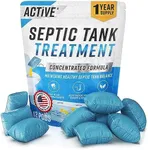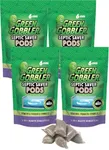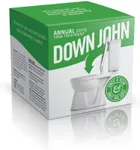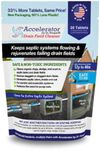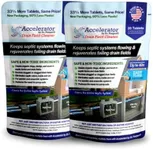Buying Guide for the Best Septic Tank Treatments
Choosing the right septic tank treatment can make a significant difference in maintaining a healthy and functional septic system. Septic tank treatments help in breaking down waste, preventing clogs, controlling odors, and supporting the overall efficiency and longevity of your septic system. Since every household and septic system is unique, it's essential to understand the key features and how they align with your system’s requirements and your usage habits. This ensures the treatment you pick promotes optimal performance and prevents unnecessary issues in the long run.Type of TreatmentThe type of septic tank treatment determines the main method it uses to break down waste, such as biological, chemical, or enzyme-based solutions. Biological treatments use naturally occurring bacteria or enzymes to digest waste and are generally seen as the safest and most environmentally friendly; these are best for regular maintenance. Chemical treatments tend to act faster and can be effective for emergency clearing but may harm helpful bacteria and the environment if used often. Enzyme-based treatments focus on breaking down specific types of waste like fats and oils. Choose biological if you seek safe long-term maintenance, consider enzyme-based if you have specific waste challenges like frequent cooking greases, and reserve chemical options only for rare emergency use.
Formulation (Powder, Liquid, Packet, Tablet)Formulation refers to the physical format of the treatment, such as whether it's a liquid you pour, a powder you sprinkle, a pre-measured tablet, or a dissolvable packet. Liquids and powders often allow for larger dosages or fast-acting results but can be messy to handle and measure. Tablets and packets are very user-friendly and minimize dosing mistakes, making them ideal for those who want convenience and less mess. Your preference in terms of ease of use and how frequently you wish to handle the treatment can guide you—simple, no-fuss packets or tablets for low-maintenance households, or liquids/powders if you prefer more dosing control.
Frequency of ApplicationThis spec describes how often you need to add the treatment to your septic system—options range from monthly, every few months, or even yearly treatments. Monthly treatments offer more regular upkeep and can be beneficial for larger or heavily used households, while less frequent options might be suitable for smaller homes or systems that see lighter use. Your household size, water usage habits, and willingness to remember schedules can help determine the right frequency—a robust system with many users benefits from regular monthly applications, while single- or dual-person homes could consider longer intervals.
Compatibility with System and UsageNot all treatments are compatible with every type of septic system or household situation. Some are designed for traditional tanks, while others may work for alternative or aerobic systems. In addition, if your system handles waste from dishwashers, garbage disposals, or is sensitive to household cleaners, the chosen treatment should not conflict or promote buildup. Always check if a treatment matches your septic system type and typical household practices to avoid causing issues. Users with advanced or non-standard systems should double-check compatibility, while standard home systems can usually use most products but should still review labels for assurance.
Environmental FriendlinessEnvironmental friendliness considers whether the ingredients are biodegradable, non-toxic, and safe for the surrounding soil and groundwater. Products that are safe for the environment reduce the risk of harming the helpful bacteria in your tank and prevent pollution. Opt for environmentally friendly treatments especially if you live near sensitive ecosystems, have a well, or use your treated effluent for watering vegetation. If reducing environmental impact is a priority, choose treatments marketed as biodegradable and free from harsh chemicals.
Odor Control EffectivenessOdor control is a significant reason many people use septic tank treatments. Some formulas are specifically designed to neutralize odors by enhancing bacterial action or including ingredients to absorb or mask smells. If your main concern is frequent or strong septic odors, select a treatment that emphasizes odor control on its label. For households without odor problems, this may be a less important factor, but for homes close to neighbors or outdoor spaces, strong odor control can make a big quality-of-life difference.
